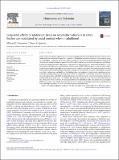Long-term effects of adolescent stress on neophobic behaviors in zebra finches are modulated by social context when in adulthood
Abstract
Experiencing stress during adolescence can increase neophobic behaviors in adulthood, but most tests have been conducted in the absence of conspecifics. Conspecifics can modulate responses to stressors, for example by acting as ‘social buffers’ to attenuate the aversive appraisal of stressors. Here, we investigate the long-term effects of adolescent stress on the behavioral responses to novel stimuli (a mild stressor) across social contexts in an affiliative passerine bird, the zebra finch. During early (days 40–60) or late (days 65–85) adolescence the birds (n = 66) were dosed with either saline or the hormone corticosterone (CORT). CORT was given in order to mimic a physiological stress response and saline was given as a control. In adulthood, the birds' behavioral responses to a novel environment were recorded in both the presence and absence of conspecifics. An acute CORT response was also quantified in adolescence and adulthood. Our findings show clear evidence of social context mediating any long-term effects of adolescent stress. In the presence of familiar conspecifics no treatment effects were detected. Individually, birds dosed with CORT in early adolescence were slower to enter a novel environment, spent more time perching in the same novel environment, and, if female, engaged in more risk assessment. Birds dosed in late adolescence were unaffected. No treatment effects were detected on CORT, but adolescents had a higher CORT concentration than adults. Our results are the first to suggest that familiar conspecifics in adulthood can buffer the long-term effects of stress that occurred during early adolescence.
Citation
Emmerson , M G & Spencer , K A 2017 , ' Long-term effects of adolescent stress on neophobic behaviors in zebra finches are modulated by social context when in adulthood ' , Hormones and Behavior , vol. 90 , pp. 48-55 . https://doi.org/10.1016/j.yhbeh.2017.02.004
Publication
Hormones and Behavior
Status
Peer reviewed
ISSN
0018-506XType
Journal article
Description
Funding was provided by a BBSRC Research Fellowship to KAS and a University of St Andrews postgraduate scholarship to MGE.Collections
Items in the St Andrews Research Repository are protected by copyright, with all rights reserved, unless otherwise indicated.

